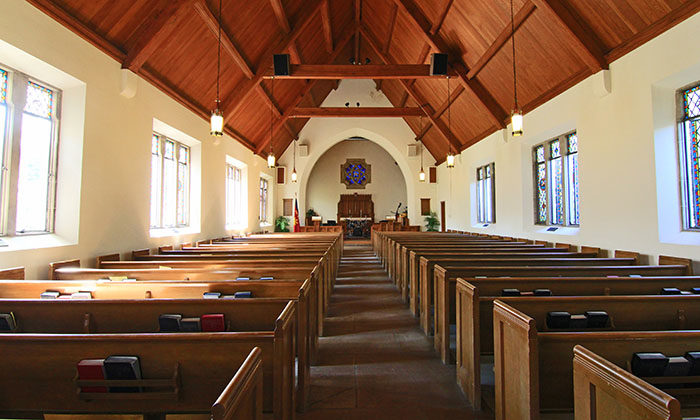
Photo by Unsplash/Debby Hudson
(RNS) — The church has left the building, as congregations have been asked or ordered not to meet due to the coronavirus. In the long run, this may be the best thing that could have happened.
Don’t misunderstand. This virus is terrible. Christians believe this is part of the fall and its lingering impact of brokenness and evil. But for 2,000 years, Christians have asked the same thing in times of trouble — what does God want us to learn in this crisis? We are exhorted to redeem the time — to see what good God can bring out of the terrible.
Charles Dickens opens his novel “The Tale of Two Cities” with the famous line “It was the best of times, it was the worst of times.”
We find ourselves in a similar season. The worst of times doesn’t need much of an explanation. COVID-19 has overturned entire economies, caused massive job loss, brought the health care system to the brink and led to significant isolation and increases in fear, anxiety and depression. And it has led to death, and more death.
It is, indeed, the worst of times.
The Apostle Paul had something similar to say about time. In his letter to the Ephesians, he urged believers to redeem the time we are given because the days are evil. Similarly, we can make the most of this time.
We can do that precisely because the church has left the building. It is perhaps the best opportunity for paradigm change we’ve seen in our lifetimes. Christians can no longer sit back and relax passively as we enjoy our worship services and small groups.
For 20 years, something called the missional conversation has called on the church to leave the building, move away from a customer-service mindset and not focus on consumers of religious goods and services.
In two weeks, this virus did what two decades of books, blogs and podcasts could not. The church has left the building, and God is at work.
Yes, all of us feel profoundly the loss of community as we have known it. I miss stepping up to the pulpit Sunday morning and looking at familiar faces smiling back at me. I miss singing worship songs together and looking around as others are worshiping God around me. When we gather again — and we will — I doubt we will take for granted the joy of community.
And likely you miss these things: togetherness, community, handshakes and hugs, face-to-face kindness and love and security, and of course, being with those with a similar worldview and passion.
We mourn the loss of these. And yet, just as God offered a “for such a time as this” to Queen Esther, he has given us a time as well. Our church doors are closed; our Christian bubbles, burst.
This is not the time for the church to sit idle; instead, it is perhaps the most important moment of our lives, when all that we have learned inside of our church walls can be fully implemented. We can show and share the love of Jesus in ways we would have never before done.
This is not the first time the church has been pushed out and scattered for the gospel. In the New Testament’s Book of Acts, following the persecution arising after the martyrdom of Stephen, believers were scattered. As they went, they did what Jesus had told them to do: They testified to the gospel. The result? A church planted in the gentile city of Antioch, which became the base of missionaries Paul and Barnabas.
For different circumstances and with different opportunities technologically, we are also scattered. Anecdotal reports of lives being changed by the gospel are encouraging, though to date no research is out on how open people are to faith conversations during this pandemic. However, based on prior LifeWay research, which found that 79% of unchurched people are open to faith conversations, I’d say that number is likely even higher during this time.
A Wall Street Journal article from March 26 bore the headline “A Coronavirus Great Awakening?” Written by Robert Nicholson, it begins: “Could a plague of biblical proportions be America’s best hope for religious revival? As the 75th anniversary of the end of World War II approaches, there is reason to think so.”
This is The Wall Street Journal, not Outreach magazine, or Christianity Today.
Church, the doors are closed behind you. You can be part of a movement such that we haven’t seen in our generation. Brokenness creates opening where hope can shine through. Our world is in a place where much of what we have trusted in is showing to be built on shifting sand. In the place of all of these things must emerge something else that will last forever.
Paul told the Galatians: “So then as we have opportunity, let us do good to everyone, and especially those who are of the household of faith.” God has pushed the church out of the building to give us the opportunity to do good to everyone around us. We can put the gospel on display before others by how we serve, and we can speak of the gospel as we encounter others.
The opportunities before us are like none we have ever known. Yes, keep connecting with your church virtually. Worship together via Zoom, meet together via FaceTime, send messages and make phone calls and write notes.
But face our broken and beat-up world knowing that you have all you need to offer the greatest news in the world — that in the worst of times, you have the best news of all.
You have left the building. So what will you do with all that you know to be true?
Courtesy: Article originally published by Religion News Service. (Ed Stetzer is executive director of the Wheaton College Billy Graham Center. Laurie Nichols contributed to this article. The views expressed in this commentary do not necessarily represent those of Religion News Service.)

